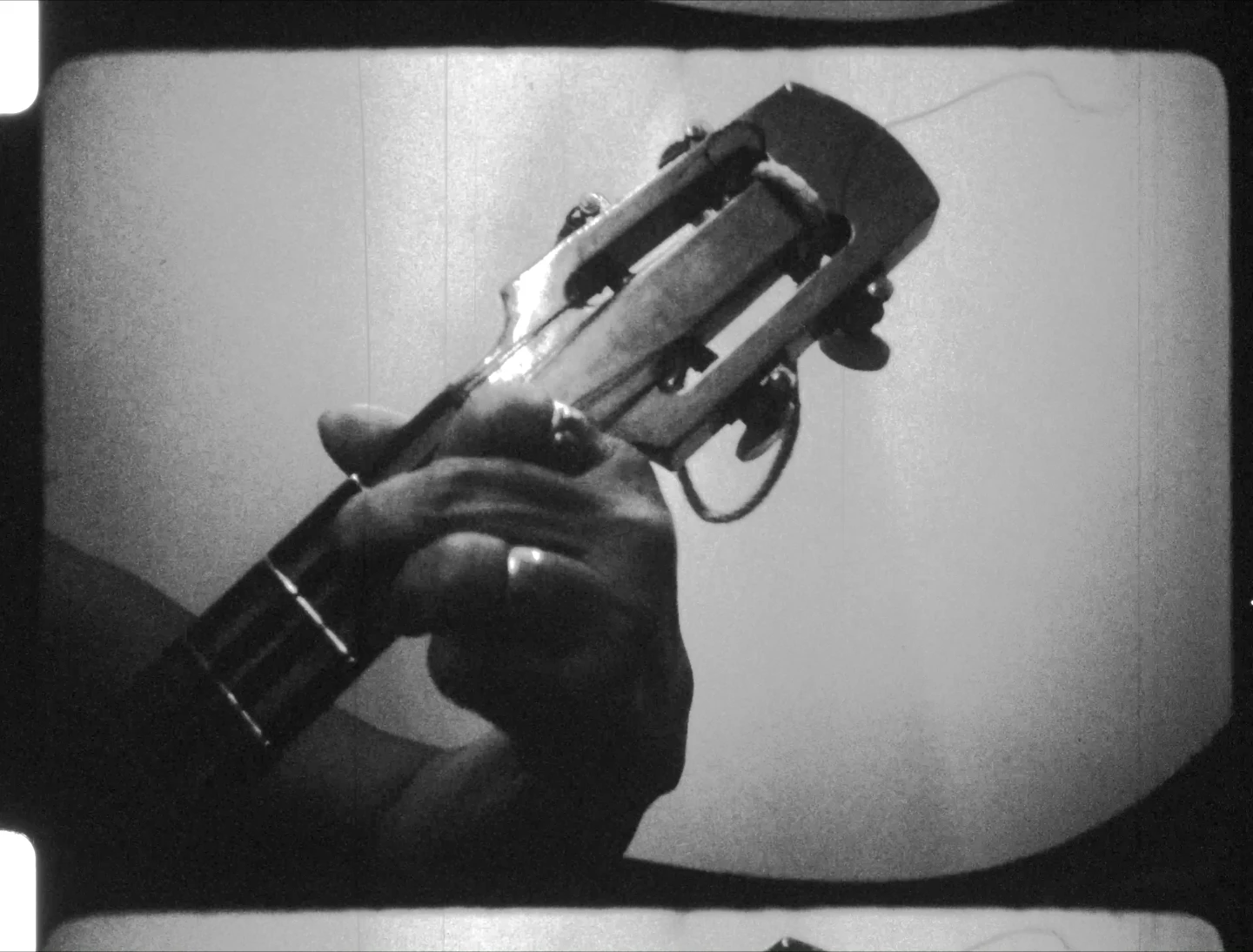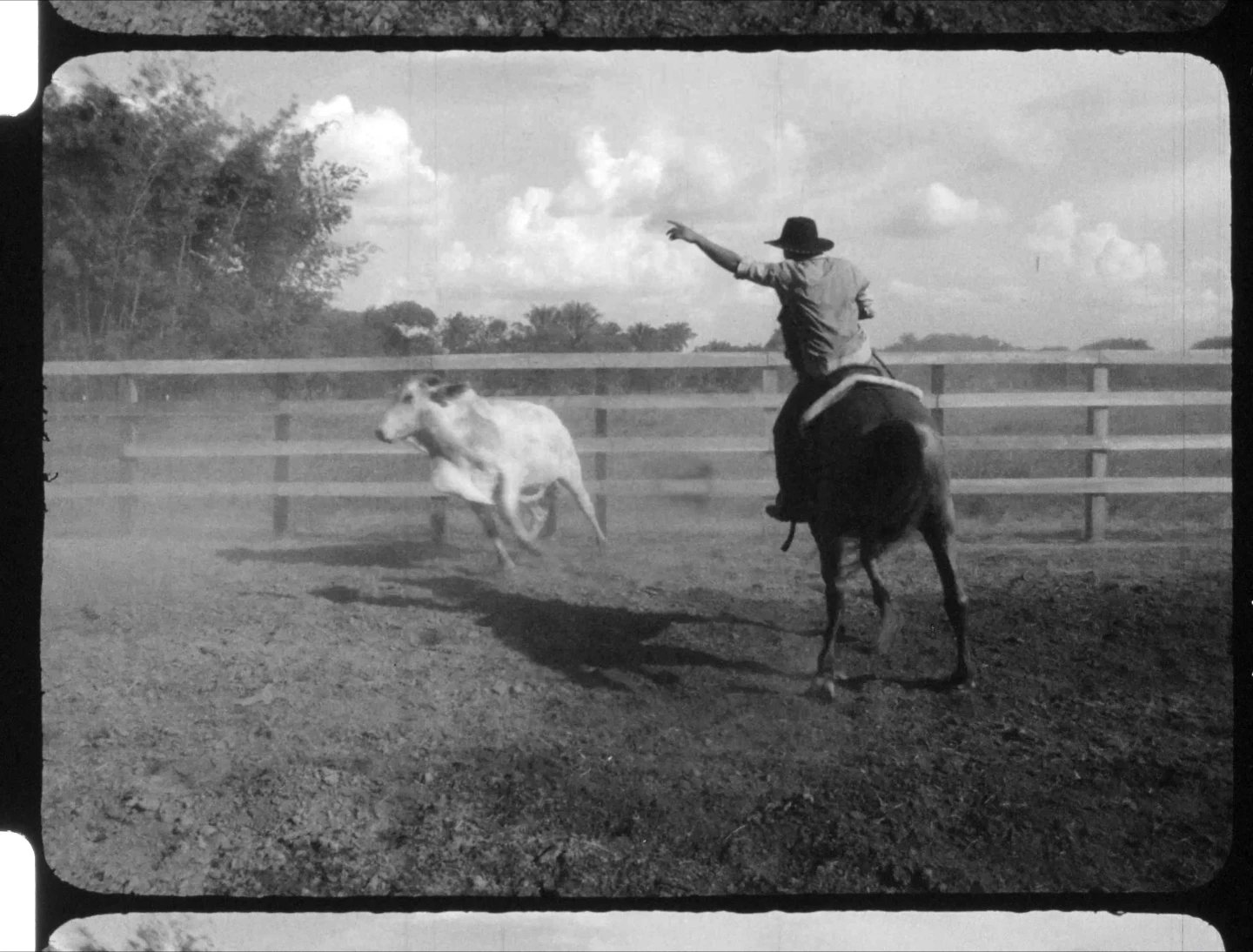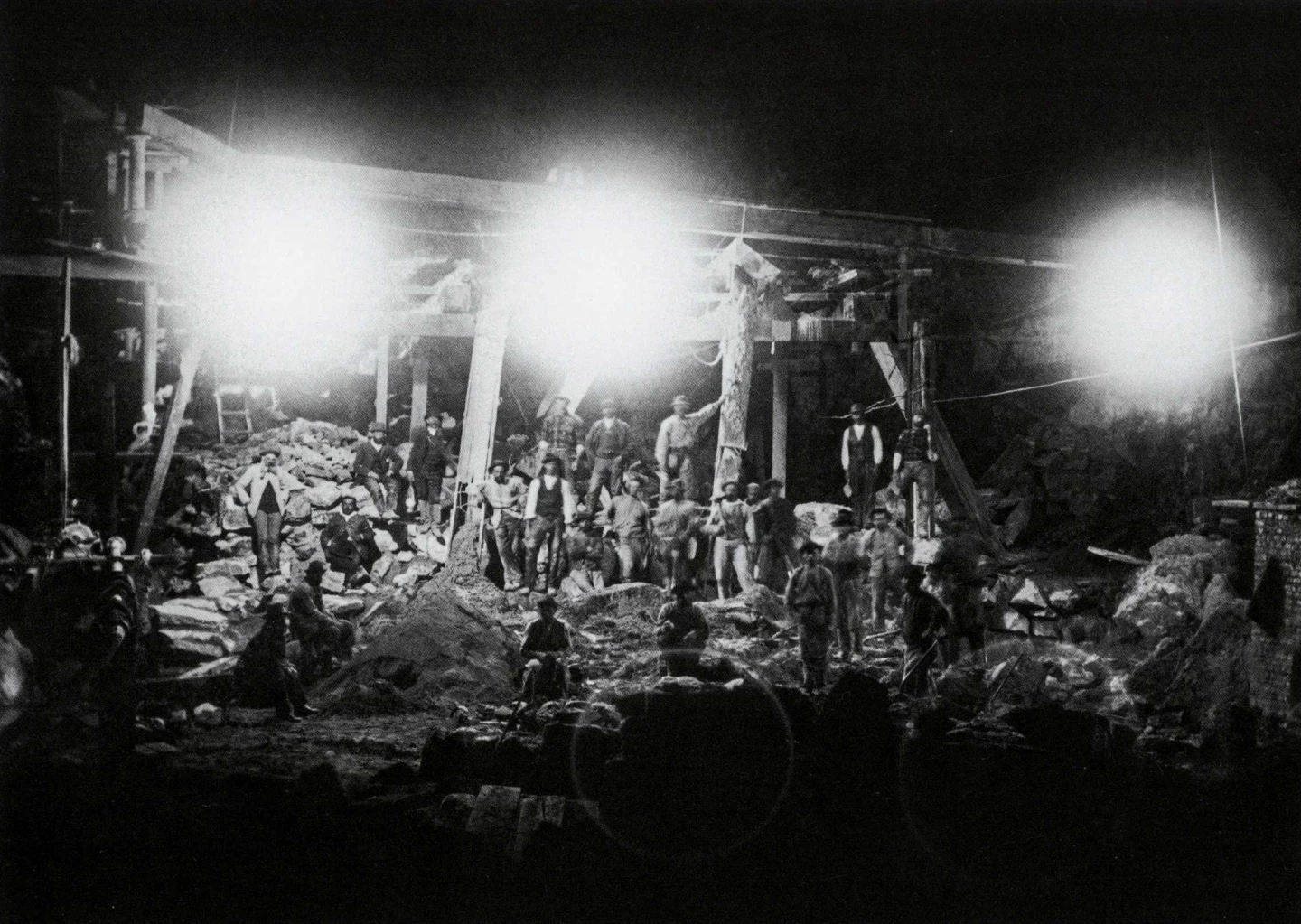The Joaquim Jordà Residencies 2025
Film screening by María Aparicio and Andrés Jurado

Andrés Jurado, Tonada, 2025, film project
Held on 07 Nov 2025
In this activity, the recipients of the 2024–2025 Joaquim Jordà Residencies call, María Aparicio (Argentina, 1992) and Andrés Jurado (Colombia, 1980), present respective projects related to their body of work in an open session in which to discover the creative interests of two of the most up-and-coming independent film-makers in Latin America today.
María Aparicio presents the working process behind her film De sol a sol (From Sun to Sun), along with a brief journey through the films prior to this project and her filmic searches in recent years. Aparicio synthesises the storyline of De sol a sol from the silhouettes of a group of men who appear between the stalks of a reedbed. Their knives glisten as the sun hits them, flashing and disappearing with their hand movements. Apprentices split the canes using no method; seasoned workers cut with skill. They are workers from a sugar mill in northern Argentina and are watched by Juan Bialet Massé, accompanied by Rosich, assistant and photographer. It is Argentina in 1904 and he is carrying out a mission assigned to him by his country’s government: to travel the Argentinian provinces, reporting on the state of the working classes.
Andrés Jurado, for his part, will look over his own work and the work of the La Vulcanizadora lab in this session. He will also open the archive stemming from the research process in the project Tonada, a journey through the succession of peace agreement betrayals in the history of Colombia. From the colonial era, understood in tumultuous terms, as a hurricane that keeps swirling, to the present day he traces the stories of people like Tacurrumbí, Benkos Biohó, Bateman and the many women and men who were betrayed by governments and oppressors. Tonada seeks to build a sound and film dialogue between the guerrilla disarmament of 1953 and the period following the peace agreement of 2016, invoking these and other events and confronting traumas of betrayal through a film composition devised to be sung. But what is sung? Some of these songs are heard and voices are shared in this presentation.
The Joaquim Jordà Residences programme for film-makers and artists was set in motion by the Museo Reina Sofía in 2022. The initiative comprises a grant for writing a film project rooted in experimentation and essay, as well as two subsequent residencies in FIDMarseille and Doclisboa, international film festivals devoted to exploring non-fictional film and new forms of audiovisual expression.
Organised by
Museo Reina Sofía
Accessible activity
This activity has two spaces reserved for people with reduced mobility
Participants
María Aparicio
(Argentina, 1992) is a film-maker and teacher. She is the director of three feature-length films: Las Calles (2016), Sobre las nubes (2022) and Las cosas indefinidas (2023), which have been shown at numerous festivals and art centres, such as Mar del Plata and BAFICI in Argentina; FICUNAM and Black Canvas in Mexico; FIC Valdivia in Chile; Márgenes, FICX Gijón, Festival Internacional de Las Palmas, Círculo de Bellas Artes and the Museo Reina Sofía in Spain; FIDMarseille in France; and Doclisboa and IndieLisboa in Portugal. Resident of the 2024-2025 Joaquim Jordà residency programme, third edition, organised by the Museo Reina Sofía, DocLisboa and FIDMarseille.
Andrés Jurado
(Colombia, 1980) is an artist, filmmaker, and researcher whose work connects experimental cinema, archives, counter-archives, contemporary art, propaganda and the politics of imagination. He co-founded and co-directs La Vulcanizadora – Laboratorio de Cine Experimental y Teatro Expandido. His films include El Renacer del Carare (2020) — FIDMarseille 2020 Special Mention, Yarokamena (2022) — Berlinale Forum Expanded and Honorable Mention at DocLisboa 2022, and Bienvenidos Conquistadores Interplanetarios y del Espacio Sideral (2024) — FIDMarseille 2024. He was part of the Forensic Architecture team in the research and exhibition Traces of Disappearance (2021), which examined land dispossession, enforced disappearances and deforestation in Colombia, in collaboration with the Colombian Truth Commission. Resident of the 2024-2025 Joaquim Jordà residency programme, third edition, organised by the Museo Reina Sofía, DocLisboa and FIDMarseille.



Más actividades

Institutional Decentralisation
Thursday, 21 May 2026 – 5:30pm
This series is organised by equipoMotor, a group of teenagers, young people and older people who have participated in the Museo Reina Sofía’s previous community education projects, and is structured around four themed blocks that pivot on the monstrous.
This fourth and final session centres on films that take the museum away from its axis and make it gaze from the edges. Pieces that work with that which is normally left out: peripheral territories, unpolished aesthetics, clumsy gestures full of intent. Instead of possessing an institutional lustre, here they are rough, precarious and strange in appearance, legitimate forms of making and showing culture. The idea is to think about what happens when central authority is displaced, when the ugly and the uncomfortable are not hidden, when they are recognised as part of the commons. Film that does not seek to be to one’s liking, but to open space and allow other ways of seeing and inhabiting the museum to enter stage.
![Tracey Rose, The Black Sun Black Star and Moon [La luna estrella negro y negro sol], 2014.](https://recursos.museoreinasofia.es/styles/small_landscape/public/Obra/AD07091_2.jpg.webp)
On Black Study: Towards a Black Poethics of Contamination
Monday 27, Tuesday 28 and Wednesday 29 of April, 2026 – 16:00 h
The seminar On Black Study: Towards a Black Poethics of Contamination proposes Black Study as a critical and methodological practice that has emerged in and against racial capitalism, colonial modernity and institutional capture. Framed through what the invited researcher and practitioner Ishy Pryce-Parchment terms a Black poethics of contamination, the seminar considers what it might mean to think Blackness (and therefore Black Study) as contagious, diffuse and spreadable matter. To do so, it enacts a constellation of diasporic methodologies and black aesthetic practices that harbor “contamination” -ideas that travel through texts, geographies, bodies and histories- as a method and as a condition.
If Blackness enters Western modernity from the position of the Middle Passage and its afterlives, it also names a condition from which alternative modes of being, knowing and relating are continually forged. From within this errant boundarylessness, Black creative-intellectual practice unfolds as what might be called a history of touches: transmissions, residues and socialities that unsettle the fantasy of pure or self-contained knowledge.
Situated within Black radical aesthetics, Black feminist theory and diasporic poetics, the seminar traces a genealogy of Black Study not as an object of analysis but as methodological propositions that continue to shape contemporary aesthetic and political life. Against mastery as the horizon of study, the group shifts attention from what we know to how we know. It foregrounds creative Black methodological practices—fahima ife’s anindex (via Fred Moten), Katherine McKittrick’s expansive use of the footnote, citation as relational and loving labour, the aesthetics of Black miscellanea, and Christina Sharpe’s practices of annotation—as procedures that disorganise dominant regimes of knowledge. In this sense, Black Study is approached not as a discrete academic field but as a feel for knowing and knowledge: a constellation of insurgent practices—reading, gathering, listening, annotating, refusing, world-making—that operate both within and beyond the university.
The study sessions propose to experiment with form in order to embrace how ‘black people have always used interdisciplinary methodologies to explain, explore, and story the world.’ Through engagements with thinkers and practitioners such as Katherine McKittrick, C.L.R. James, Sylvia Wynter, Christina Sharpe, Fred Moten, Tina Campt, Hilton Als, John Akomfrah, fahima ife and Dionne Brand, we ask: What might it mean to study together, incompletely and without recourse to individuation? How might aesthetic practice function as a poethical intervention in the ongoing work of what Sylvia Wynter calls the practice of doing humanness?

Intergenerationality
Thursday, 9 April 2026 – 5:30pm
This series is organised by equipoMotor, a group of teenagers, young people and older people who have participated in the Museo Reina Sofía’s previous community education projects, and is structured around four themed blocks that pivot on the monstrous.
The third session gazes at film as a place from which to dismantle the idea of one sole history and one sole time. From a decolonial and queer perspective, it explores films which break the straight line of past-present-future, which mix memories, slow progress and leave space for rhythms which customarily make no room for official accounts. Here the images open cracks through which bodies, voices and affects appear, disrupting archive and questioning who narrates, and from where and for whom. The proposal is at once simple and ambitious: use film to imagine other modes of remembering, belonging and projecting futures we have not yet been able to live.

Remedios Zafra
Thursday March 19, 2026 - 19:00 h
The José Luis Brea Chair, dedicated to reflecting on the image and the epistemology of visuality in contemporary culture, opens its program with an inaugural lecture by essayist and thinker Remedios Zafra.
“That the contemporary antifeminist upsurge is constructed as an anti-intellectual drive is no coincidence; the two feed into one another. To advance a reactionary discourse that defends inequality, it is necessary to challenge gender studies and gender-equality policies, but also to devalue the very foundations of knowledge in which these have been most intensely developed over recent decades—while also undermining their institutional support: universities, art and research centers, and academic culture.
Feminism has been deeply linked to the affirmation of the most committed humanist thought. Periods of enlightenment and moments of transition toward more just social forms—sustained by education—have been when feminist demands have emerged most strongly. Awareness and achievements in equality increase when education plays a leading social role; thus, devaluing intellectual work also contributes to harming feminism, and vice versa, insofar as the bond between knowledge and feminism is not only conceptual and historical, but also intimate and political.
Today, antifeminism is used globally as the symbolic adhesive of far-right movements, in parallel with the devaluation of forms of knowledge emerging from the university and from science—mistreated by hoaxes and disinformation on social networks and through the spectacularization of life mediated by screens. These are consequences bound up with the primacy of a scopic value that for some time has been denigrating thought and positioning what is most seen as what is most valuable within the normalized mediation of technology. This inertia coexists with techno-libertarian proclamations that reactivate a patriarchy that uses the resentment of many men as a seductive and cohesive force to preserve and inflame privileges in the new world as techno-scenario.
This lecture will address this epochal context, delving into the synchronicity of these upsurges through an additional parallel between forms of patriarchal domination and techno-labor domination. A parallel in which feminism and intellectual work are both being harmed, while also sending signals that in both lie emancipatory responses to today’s reactionary turns and the neutralization of critique. This consonance would also speak to how the perverse patriarchal basis that turns women into sustainers of their own subordination finds its equivalent in the encouraged self-exploitation of cultural workers; in the legitimation of affective capital and symbolic capital as sufficient forms of payment; in the blurring of boundaries between life and work and in domestic isolation; or in the pressure to please and comply as an extended patriarchal form—today linked to the feigned enthusiasm of precarious workers, but also to technological adulation. In response to possible resistance and intellectual action, patriarchy has associated feminists with a future foretold as unhappy for them, equating “thought and consciousness” with unhappiness—where these have in fact been (and continue to be) levers of autonomy and emancipation.”
— Remedios Zafra

ARCO2045. The Future, for Now
Saturday 7, March 2026 - 9:30pm
The future, its unstable and subjective nature, and its possible scenarios are the conceptual focus of ARCOmadrid 2026. A vision of the future linked to recent memory, a flash of insight into a double-edged sword. This year's edition, as in the previous two, will once again hold its closing party at the Reina Sofia Museum. This time, the star of the show is Carles Congost (Olot, Girona, 1970), one of the artists featured in the new presentation of the Collections recently inaugurated on the 4th floor of the Sabatini Building.
Carles Congost, with his ironic and timeless gaze, is responsible for setting the tone for this imperfect future, with a DJ session accompanied by some of his works in the Cloister on the first floor of the Sabatini Building of the Museo on the night of Saturday 7 March.